The UAE is worried about the anger of Iran and resistance groups

TEHRAN - In a note, Kayhan addressed the limitation of the U.S. military by the UAE and wrote: The American publication Politico says that the UAE has limited the U.S. military in using its military base for attacks against groups close to Iran.
According to a U.S. official, amid rising civilian casualties in Gaza, many Arab countries, particularly those trying to improve relations with Iran, are increasingly limiting the United States and its partners from carrying out military operations from their soil against groups close to Iran. They don't want to appear as if they are against Iran. For many years, the United States has deployed thousands of soldiers in military facilities in the United Arab Emirates, Kuwait, Bahrain, Oman, Qatar and other parts of the Middle East. Politico's attempt to exonerate the UAE from playing a role in the U.S. attacks has been carried out at the same time as some reports on close economic and political deals with the criminal Zionist regime.
Iran: John Bolton's confession about Iran
In an analysis, the Iran newspaper dealt with the failure of anti-revolution elements in the sabotage project as well as John Bolton's admission of this failure and said: These days, the enemies and anti-Iranian opposition groups are in the most passive situation possible towards the Islamic Republic and the people. Those who were following the project of sabotage against the Islamic Republic of Iran last year and the Zionist regime, America and some Western countries declared their support for the Iranian opposition. But this project failed. Bolton admitted that the government's decisive response to the flow of chaos and terror was an important factor in the failure of the riots. Despite Bolton's rhetoric, American political and military officials have repeatedly stated that they are not looking for a direct conflict with the Islamic Republic. While Bolton acknowledges the failure of the chaos and the stability of the Islamic Republic, he promised in 2018, in the presence of the members of the terrorist organization of the MKO, that the Islamic Revolution of Iran would not see its 40th anniversary!
Hamshahri: Tel Aviv's target of terrorist explosions
In a conversation with Hassan Hanizadeh, an expert on regional issues, Hamshahri addressed the things behind the terrorist explosion of the gas pipeline of two provinces in Iran and wrote: The New York Times claimed that these explosions were the conspiracy of the Zionist regime. Carrying out such terrorist acts by the Zionist regime can be seen as an indication of Tel Aviv's confusion over the heavy defeats of the resistance front in recent months. The Zionist regime believes that Tel Aviv's failures in the occupied territories are more than anything due to Iran's field management in the axis of resistance because Iran has been able to establish proper coherence in the axis of resistance throughout the region, from Yemen and Lebanon to Iraq and Syria. Experience has proven that whenever the Zionist regime suffers a defeat in the region or faces a crisis in the domestic political arena, it has moved towards targeted terrorist actions and explosions in some parts of the region. The recent explosion is a purposeful measure to create dissatisfaction among the people, and it is on the eve of the March elections.
Shargh: Anti-Iranian statement of Group 7
In an article, Shargh addressed the anti-Iranian statement of the Group of 7 on the sidelines of the Munich Security Conference and wrote: The members of the Group of Seven once again repeated their claims about Iran's regional role and nuclear program and once again asked Iran to stop "helping the Russian army and its aggression against Ukraine." These claims have been raised while Iran has repeatedly declared that it is not a party to the war between Ukraine and Russia, and it is the Western countries that are fanning the flames of conflict by sending weapons to one side of the war. Repeating the claim about Iran's regional role, the Group of 7 said that continuing to send weapons from Iran to the Yemeni army is a violation of UN Security Council Resolution 2216 and causes the escalation of tensions in the region. In response to previous Western claims, Iran has emphasized that it does not have a "proxy force" in the region, and the resistance groups and the Yemeni army act based on the interests of their countries. Iran has repeatedly declared that it is not seeking to build nuclear weapons. In addition, the progress in nuclear programs has been according to the JCPOA and due to the disloyalty of the western side. Tehran has emphasized that Iran's nuclear actions are reversible and as soon as the Westerners return to the agreement, these actions will be reversed. But according to this group, a diplomatic solution is the best way to address global concerns.
Leave a Comment